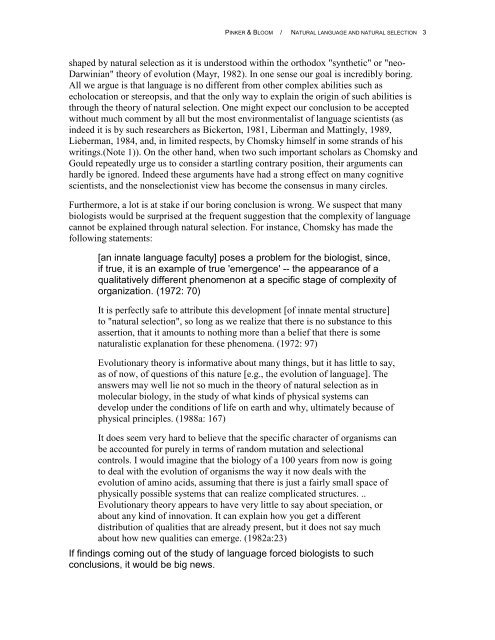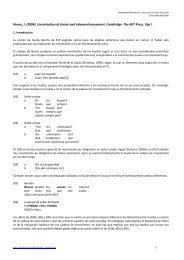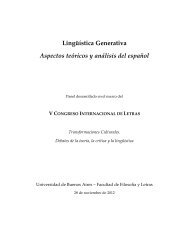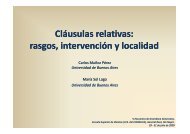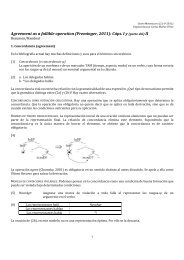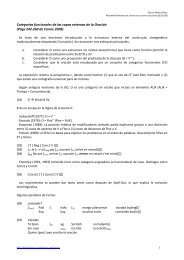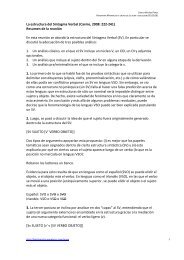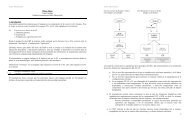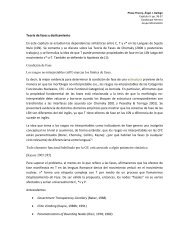Pinker - Bloom - NATURAL LANGUAGE AND NATURAL SELECTION
Pinker - Bloom - NATURAL LANGUAGE AND NATURAL SELECTION
Pinker - Bloom - NATURAL LANGUAGE AND NATURAL SELECTION
You also want an ePaper? Increase the reach of your titles
YUMPU automatically turns print PDFs into web optimized ePapers that Google loves.
PINKER & BLOOM / <strong>NATURAL</strong> <strong>LANGUAGE</strong> <strong>AND</strong> <strong>NATURAL</strong> <strong>SELECTION</strong> 3<br />
shaped by natural selection as it is understood within the orthodox "synthetic" or "neo-<br />
Darwinian" theory of evolution (Mayr, 1982). In one sense our goal is incredibly boring.<br />
All we argue is that language is no different from other complex abilities such as<br />
echolocation or stereopsis, and that the only way to explain the origin of such abilities is<br />
through the theory of natural selection. One might expect our conclusion to be accepted<br />
without much comment by all but the most environmentalist of language scientists (as<br />
indeed it is by such researchers as Bickerton, 1981, Liberman and Mattingly, 1989,<br />
Lieberman, 1984, and, in limited respects, by Chomsky himself in some strands of his<br />
writings.(Note 1)). On the other hand, when two such important scholars as Chomsky and<br />
Gould repeatedly urge us to consider a startling contrary position, their arguments can<br />
hardly be ignored. Indeed these arguments have had a strong effect on many cognitive<br />
scientists, and the nonselectionist view has become the consensus in many circles.<br />
Furthermore, a lot is at stake if our boring conclusion is wrong. We suspect that many<br />
biologists would be surprised at the frequent suggestion that the complexity of language<br />
cannot be explained through natural selection. For instance, Chomsky has made the<br />
following statements:<br />
[an innate language faculty] poses a problem for the biologist, since,<br />
if true, it is an example of true 'emergence' -- the appearance of a<br />
qualitatively different phenomenon at a specific stage of complexity of<br />
organization. (1972: 70)<br />
It is perfectly safe to attribute this development [of innate mental structure]<br />
to "natural selection", so long as we realize that there is no substance to this<br />
assertion, that it amounts to nothing more than a belief that there is some<br />
naturalistic explanation for these phenomena. (1972: 97)<br />
Evolutionary theory is informative about many things, but it has little to say,<br />
as of now, of questions of this nature [e.g., the evolution of language]. The<br />
answers may well lie not so much in the theory of natural selection as in<br />
molecular biology, in the study of what kinds of physical systems can<br />
develop under the conditions of life on earth and why, ultimately because of<br />
physical principles. (1988a: 167)<br />
It does seem very hard to believe that the specific character of organisms can<br />
be accounted for purely in terms of random mutation and selectional<br />
controls. I would imagine that the biology of a 100 years from now is going<br />
to deal with the evolution of organisms the way it now deals with the<br />
evolution of amino acids, assuming that there is just a fairly small space of<br />
physically possible systems that can realize complicated structures. ..<br />
Evolutionary theory appears to have very little to say about speciation, or<br />
about any kind of innovation. It can explain how you get a different<br />
distribution of qualities that are already present, but it does not say much<br />
about how new qualities can emerge. (1982a:23)<br />
If findings coming out of the study of language forced biologists to such<br />
conclusions, it would be big news.


